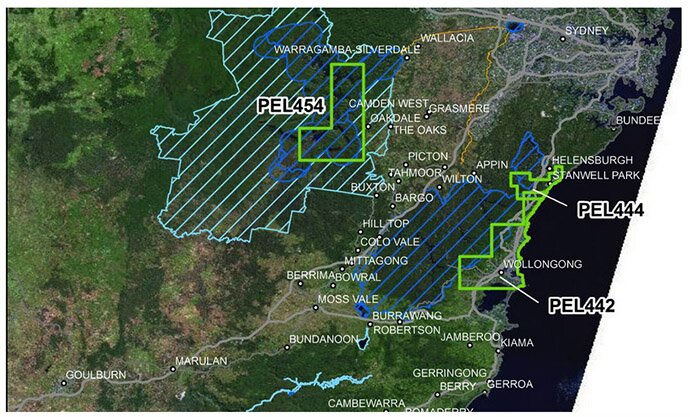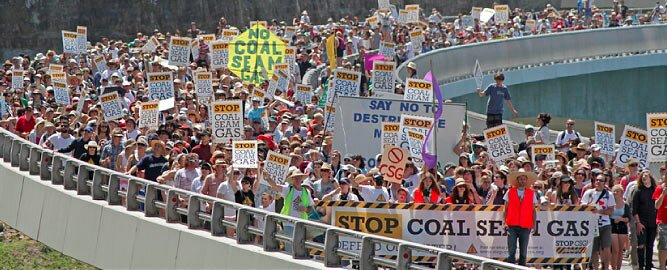
The long-awaited report on coal seam gas (CSG) from the NSW Chief Scientist and Engineer makes it clear that CSG development is unacceptable in our drinking water catchments.
In the context of damaging, toxic and radioactive problems both overseas and in Australia, people in NSW have been asking ‘is CSG safe and, if so, under what conditions?’ Most think this question should have been answered before approval to drill was given.
Given extraordinary community efforts to demand change – the NSW Government commissioned a review. It called on the NSW Chief Scientist and Engineer, Professor Mary O’Kane, to review CSG activity in NSW. The review took 18 months to complete and was delivered on 30 September 2014.
The CSG Review’s terms of reference
This review was framed by terms of reference, written by the Government. They called on Professor O’Kane to do six things:
- Look at industry compliance
- Identify and assess any gaps in the identification and management of risk
- Identify best practice
- Compare CSG in NSW with other places
- Inspect and monitor current activities
- Produce a series of information papers ‘on specific elements of CSG operation and impact’
Essentially, she was asked to look at how CSG has – and can continue to be – developed. She was not asked to answer the question ‘is CSG safe to develop and, if so, under what conditions?’.
Despite this very important distinction, Professor O’Kane still found cause to include many warnings and concerns, going as far as to suggest there are areas that should be off-limits to CSG – though she does not define these areas.
The report found:
‘it is inevitable that the CSG industry will have some unintended consequences’
- There are risks and ‘significant concerns.’
- There are still ‘things we need to know more about.’
- That drilling should only be allowed in areas ‘appropriate in geological and land-use terms for CSG.’
- Risks could ‘in general be managed’ through ‘engineering and professionalism’, regulation, legislation, ‘a well-trained and certified workforce’, data collection, monitoring and use ‘of new technological developments as they become available.’
- ‘Rapid emergency response and effective remediation’ as well as ‘insurance cover’ should be planned for, in case things go wrong.
- ‘There are no guarantees’ and that risks cannot not be ruled out, concluding ‘it is inevitable that the CSG industry will have some unintended consequences, including as the result of accidents, human error, and natural disasters.’
Essentially, the report concludes that there are risks, but that those risks can be ‘managed’ (albeit theoretically only – based on data yet to be collected, and emerging technology). It goes on to say that ‘in particularly sensitive areas, such as in and near drinking water catchments, risk management needs to be of a high order with particularly stringent requirements on companies operating there in terms of management, data provision, insurance cover, and incident-response times.’ When quizzed further on the appropriateness of CSG in our catchments in a subsequent media interview, Professor O’Kane suggested a ‘learn as we go’ approach would be needed.
The CSG industry response

Tom Fontaine – spokesperson for the Apex Energy CSG project – holds interests in several oil and gas ventures worldwide.
The CSG industry has been very quick to seize on the report’s findings as a green light for development. Apex Energy holds the license over the drinking water catchments for Greater Sydney and project spokesperson, Tom Fontaine, claims the report ‘supports the company’s position that there are no issues with coal methane development’ and ‘If there were any chance of aquifer or drinking water contamination we would not proceed’. He also scorns community concerns and any representation of them by the Government, suggesting that it will take ‘some people to grow a pair I guess before anything will happen’
Given the very clear concerns expressed in the report, these comments can only be viewed as wilfully misleading. Indeed, speaking in a media interview with Alan Jones shortly after the report’s release, Professor O’Kane said she had been ‘startled’ by the headlines and industry response interpreting her report’s conclusions as a ‘green light’ to proceed.
Put simply, if there is no chance of contamination why does the report recommend ‘rapid emergency response and effective remediation’ and the need for ‘insurance cover’?
What do the Sydney Catchment Authority say about CSG?
 The Sydney Catchment Authority (SCA) manages the drinking water catchments for Greater Sydney. The Authority’s key role is to ensure the quality and quantity of water in the catchments – protecting public health and safety, and the environment. Some ‘Special Areas’ of the catchment are considered so sensitive that the public is prohibited from even walking in them, with fines up to $44,000 applying for illegal access. Astonishingly – CSG licences cover these areas and the holders, Apex Energy, have development plans to drill within them.
The Sydney Catchment Authority (SCA) manages the drinking water catchments for Greater Sydney. The Authority’s key role is to ensure the quality and quantity of water in the catchments – protecting public health and safety, and the environment. Some ‘Special Areas’ of the catchment are considered so sensitive that the public is prohibited from even walking in them, with fines up to $44,000 applying for illegal access. Astonishingly – CSG licences cover these areas and the holders, Apex Energy, have development plans to drill within them.
The SCA requires that ‘any proposed development in the catchment area is required to have a neutral or beneficial effect on water quality’. It could not be any clearer that CSG development cannot meet this requirement, given Professor O’Kane’s conclusion that ‘it is inevitable that the CSG industry will have some unintended consequences, including as the result of accidents, human error, and natural disasters.’
Separate to Professor O’Kane’s report, the SCA have made their opposition to CSG development in the catchment Special Areas very clear. In 2013, they provided a submission to the Planning Assessment Commission regarding Apex Energy’s CSG project within the catchment, concluding: ‘Given the real and potential risks to Special Areas and Sydney’s water supply, SCA’s strong position is that coal seam gas activities should be excluded from the Special Areas.’ It’s a position they continue to stress to this day.
How should the government respond?
Last year the Government put a temporary freeze on CSG development in Sydney’s drinking water catchment ‘Special Areas’, pending the outcomes of Professor O’Kane’s review. The Government must now respond and is said to be considering the report’s findings.
An industry with ‘no guarantees’ that may require a ‘rapid emergency response’ simply shouldn’t be allowed in our water catchments
The report makes it clear there are many risks involved in CSG development. Given those risks and the unequivocal advice of the Sydney Catchment Authority, it’s clear that we need permanent no-go zones including a complete ban on CSG in our water catchments. An industry with ‘no guarantees’ that may require a ‘rapid emergency response’ simply shouldn’t be allowed in such vital areas. When it comes to the protection of our drinking water supply, the community needs guarantees that this report says it cannot give.
The Government should also go further and freeze the industry while informed decisions are made. Given the risks and unknowns highlighted, we need to press pause on CSG development across the state. We don’t want another public health issue on the scale of asbestos or thalidomide.
The government needs to talk and listen to communities on this issue, as well as the growing chorus from within their own ranks and the opposition. Not for the first time, we ask the question of them – ‘who do you work for?’





 The Sydney Catchment Authority (SCA) manages the drinking water catchments for Greater Sydney. The Authority’s key role is to ensure the quality and quantity of water in the catchments – protecting public health and safety, and the environment. Some ‘Special Areas’ of the catchment are considered so sensitive that the public is prohibited from even walking in them, with fines up to $44,000 applying for illegal access. Astonishingly – CSG licences cover these areas and the holders, Apex Energy, have development plans to drill within them.
The Sydney Catchment Authority (SCA) manages the drinking water catchments for Greater Sydney. The Authority’s key role is to ensure the quality and quantity of water in the catchments – protecting public health and safety, and the environment. Some ‘Special Areas’ of the catchment are considered so sensitive that the public is prohibited from even walking in them, with fines up to $44,000 applying for illegal access. Astonishingly – CSG licences cover these areas and the holders, Apex Energy, have development plans to drill within them.

 Locally, a huge community-wide effort to stop CSG and protect our drinking water catchment achieved two big changes for CSG development in the Illawarra in 2013; the previously approved CSG project was
Locally, a huge community-wide effort to stop CSG and protect our drinking water catchment achieved two big changes for CSG development in the Illawarra in 2013; the previously approved CSG project was 

